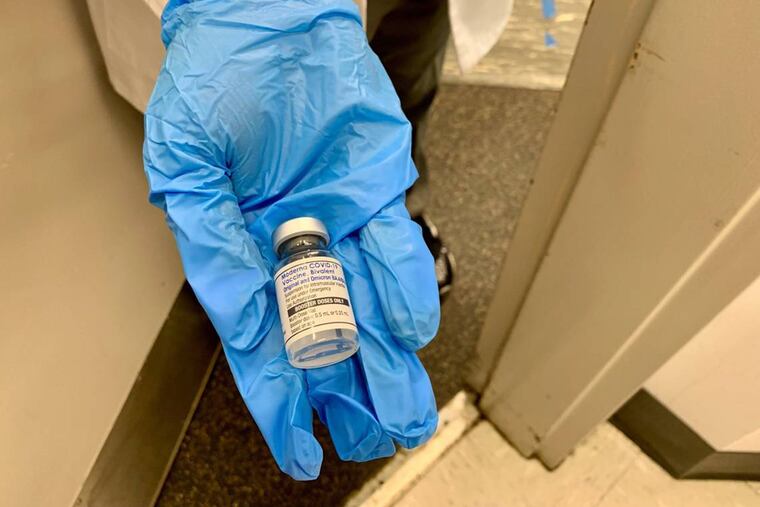Why St. Luke’s University Health Network isn’t recommending the new COVID vaccine
One regional hospital system is taking a wait and see approach to recommending the latest COVID vaccines.

An eastern Pennsylvania hospital system is holding off on recommending the latest COVID-19 booster shot for its already vaccinated patients.
There is no concern about the safety of the vaccines, said Jeffrey Jahre, senior vice president of medical and academic affairs at St. Luke’s University Health Network, which operates 11 hospitals in the Lehigh Valley, plus one in Bucks County. The new bivalent vaccine, designed specifically to attune the immune response to omicron variants, is now the only one available for COVID and the hospital system is offering it.
But it isn’t yet recommending it.
“We are concerned that the efficacy may not live up to its hope,” Jahre said.
St. Luke’s expects to wait about a month for evidence the new vaccine is providing meaningfully more protection before recommending it, he said.
“The data will hopefully be much more obvious within hopefully a short period of time,” he said. “What we’re telling people is, in many cases, there isn’t a great hurry.”
COVID-19 vaccines have been considered one of modern medicine’s biggest successes. The two-shot vaccination that rolled out in late 2020, less than a year into the pandemic, has proven effective at preventing serious illness and death.
But they didn’t stop COVID from spreading, especially as the virus has continued to evolve. Federal health authorities for months have been recommending booster shots for most adults, but only 31% of Pennsylvanians have received at least one booster shot, according to Pennsylvania health department data. Just over a quarter of Pennsylvanians have not gotten any vaccine doses.
New vaccine targets omicron variants
The latest bivalent vaccines were designed to counter omicron variants of COVID-19, which now account for virtually all of the country’s infections.
Approved for distribution this month, they combine the original vaccine with a new recipe designed to offer robust protection against the highly contagious omicron variants BA.4 and BA.5.
Data presented to the Centers for Disease Control and Prevention Sept. 1 indicated the new bivalent vaccines spurred an improved immune response in people who had received a full series plus a booster of the older vaccine. It also proved more effective against omicron.
» READ MORE: Do I need the new COVID booster? And other questions you may have.
How much more protection the bivalent vaccines offer, though, isn’t clear. Like each year’s flu shot, this latest COVID vaccine was only tested in mice.
That doesn’t raise safety concerns, Jahre said, but it does leave uncertainty about how effective it’ll be in people.
And some experts no longer see the same urgency as when vaccines first became available at the end of 2020, when hospitals had hundreds of sick patients, some of them dying.
“That is absolutely not the situation currently,” Jahre said.
Due to vaccination, natural immunity, or a combination of both, most people are much more protected against the more serious consequences of COVID than they were almost two years ago.
Jahre, though, said there are still going to be breakthrough infections, as there have been with the older vaccine, and he doesn’t anticipate the new vaccine changing the course of hospitalizations this fall.
Earlier this week, a Kaiser Health News opinion piece by the health care news outlet’s editor-in-chief and editor-at-large for public health also raised questions about the need for the shots.
“Is the $3.2 billion price tag worth the unclear benefit?” the piece stated. “Especially when these funds had to be pulled from other COVID response efforts, like testing and treatment.”
The piece noted additional protection may be valuable to people with some health conditions and the elderly, but perhaps not for everyone 12 and older, who are now eligible to receive the bivalent shots.
Paul Offit, director of the Vaccine Education Center at Children’s Hospital of Philadelphia and a member of the FDA’s independent advisory panel that decides whether to approve new vaccines, has in the past raised similar concerns about the need for boosters. Offit has said most healthy people are protected by the vaccines they’ve already received.
» READ MORE: COVID cases keep rising and so does the risk of long COVID. Philly researchers are trying to understand why.
White House calls for Americans to get the new vaccine
The Biden administration has said the new vaccines are key to heading off an anticipated wave of COVID infections this fall.
Ashish Jha, White House COVID-19 response coordinator, earlier this month said the bivalent vaccines were a step toward routine annual COVID vaccination similar to what’s done to mitigate flu season.